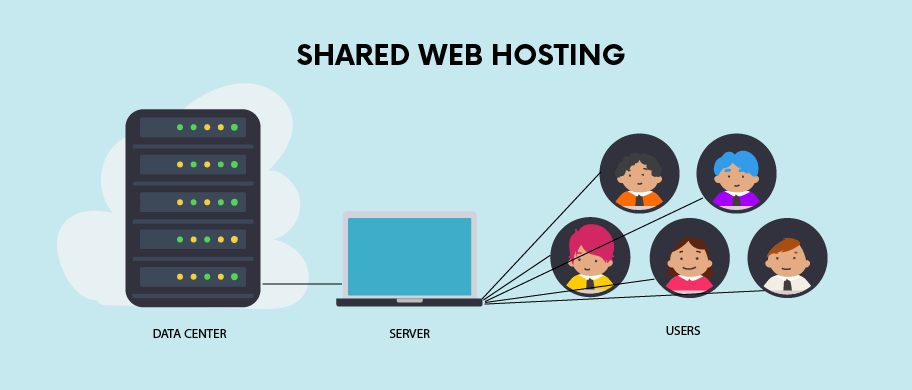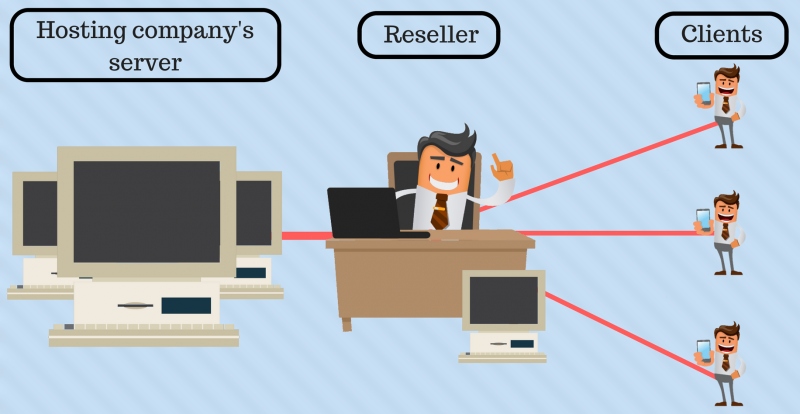Table of Contents
Web hosting services allow individuals and organizations to create and place websites on the internet. A Web hosting service provider offers the technology and platform that allow persons to view these websites on the internet. In fact, these service providers offer a number of plans to suit specific needs. That’s why we made an overview for you to show you the key difference between shared and reseller hosting. Let’s look at two of these plans: shared hosting and reseller hosting.
Shared website hosting is the most economical form of Web hosting. It is great for single websites, small businesses and websites with low-traffic. While reseller web hosting for persons who want to host multiple websites or sell hosting services. It is worth noting that reselling is not allowed on shared hosting plans.
What Is Shared Hosting?

Shared hosting is when the hosting company sets up a web server to operate multiple websites. Each customer is given a private account on the server to create and manage their website.
However, all of the sites on that server run using the same pool of system resources. A hosting company could put a few customers to several hundred onto one web server.
Allowing multiple customers to operate their websites on one server helps to keep the costs low so that the hosting company can offer this type of service at an affordable price. Shared hosting is most often used for small to midsize websites. It is a great way to get reliable services without breaking your budget.
Advantages of Shared Hosting
Here is a top 4 list of advantages of shared website hosting.
1 – The cPanel is User-Friendly
You get access to a user-friendly cPanel control panel to manage and make changes to your web hosting account. It also comes with a number of features for managing your website builder, upload files and images, check website’s stats, set up email accounts, and add an SSL certificate.
2 – Ability to Host Multiple Domains
There is a common misconception that you can’t host several websites on a shared server. Consider that debunked as you can add other domains and host them on the same server by using the “Addon Domain” feature.
3 – It’s Cost Efficient
Shared hosting is the cheapest of all hosting options. So choosing a shared server, considering it is best for your business, fits well into almost any budget.
4 – It’s Convenience
With shared hosting, the service providers manage your website for you. This gives you the time to focus completely on growing your business and website
Disadvantages of Shared Hosting
1 – Downtime
If there are too many persons sharing one server, it can result in your website moving slowly and can cause a significant amount of downtime. Usually hosting providers put measures in place to prevent this. However, even a spike in traffic for other websites sharing a server with you can slow yours down.
2 – Performance
With shared hosting whatever happens on another site on the server can affect your uptime and performance. A surge in traffic on one of those other websites will result in your website slowing down. A website that loads slowly usually loses potential customers.
3 – Security
Though service providers install software to protect your website, it cannot guarantee 100% security. Simply because there are numerous users on the same server. If your website suffers from an attack, it will affect the other sites on the server and vice versa.
What Is Reseller Hosting?

This form of webhosting allows an account owner to use their designated RAM and bandwidth to host third-party websites. Basically, they buy wholesale hosting services then divides them into smaller plans which they sell to individuals.
Reseller webhosting plans gives account owners the ability to use their cPanel to create and manage multiple cPanel hosting accounts. This is for instance great if you are selling web hosting to your clients and friends. They can do so by using Web Host Manager (WHM). Each account will get its own resources including a personal username/password. This hosting solution works well for website developers or individuals wishing to resell web hosting. There are several reseller plans to choose from. Depending on the one you select you can add up to 250 private cPanel accounts. Therefore cpanelresellerwebhosting.in is giving the best cpanel hosting reseller program you can think of.
Advantages of reseller hosting?
Learn about these advantages that can make reseller hosting a great option:
- Offset your expenses: If you can sell access to your web hosting environment, it can easily balance your other website-related expenses, which can be great for budgeting.
- Income stream: If your business can sell web hosting as an add-on, this reseller hosting can create an excellent additional income stream.
- Quality hosting: Whether you resell the hosting or not, reseller accounts need to support multiple websites and are thus of higher quality.
Disadvantages of reseller hosting?
Not surprisingly, reseller hosting isn’t the right option for every customer as it works best for creating income through selling web hosting. Consider the following disadvantages:
- Complicated: You aren’t just buying a normal web hosting service, but essentially a web hosting business. You must know how to manage marketing, billing, and other services to make it worthwhile.
- Price: You can get reseller hosting at many different price points. In general, it is more expensive than a traditional hosting account because you get all the additional features needed for reselling access to your hosting environment.
- Specific usage: This type of hosting is only a good option if you plan on reselling hosting space. If you don’t, there’s no real reason for this type of hosting.
Comparing Reseller Hosting and Shared Hosting

Performance:
- Shared Hosting: In shared hosting, resources are divided among multiple users on the same server. While it’s cost-effective, high traffic or resource-intensive websites on the same server can impact performance.
- Reseller Hosting: Reseller hosting typically offers better performance since resources are allocated more exclusively. Resellers have control over resource distribution, ensuring better performance for their clients.
Scalability:
- Shared Hosting: Limited scalability due to shared resources. Sites experiencing growth may face limitations.
- Reseller Hosting: More scalable as resellers can allocate resources as needed, allowing for flexibility when clients’ needs change.
Cost:
- Shared Hosting: Usually more cost-effective due to shared resources and infrastructure.
- Reseller Hosting: Can be more expensive, considering the added features and control resellers have over the hosting resources.
Security:
- Shared Hosting: Security risks are slightly higher due to shared environments. Vulnerabilities in one site can potentially affect others.
- Reseller Hosting: Offers better security as resellers can implement additional security measures and control which sites they host.
Use Cases: When to Choose Which
Scenarios for Shared Hosting:
- Shared hosting is ideal for personal blogs or small websites that don’t anticipate high traffic.
- For those on a tight budget, shared hosting is cost-effective, offering an affordable entry point into hosting.
- Basic websites without resource-intensive features or functionalities work well in shared hosting environments.
Scenarios for Reseller Hosting:
- Reseller hosting suits professionals offering web services, allowing them to provide hosting as part of their packages.
- When small businesses need to host multiple websites or offer hosting to their clients, reseller hosting provides control and customization.
- Reseller hosting is preferable for websites with scalability needs. As businesses grow, reseller hosting allows for resource allocation as needed.
